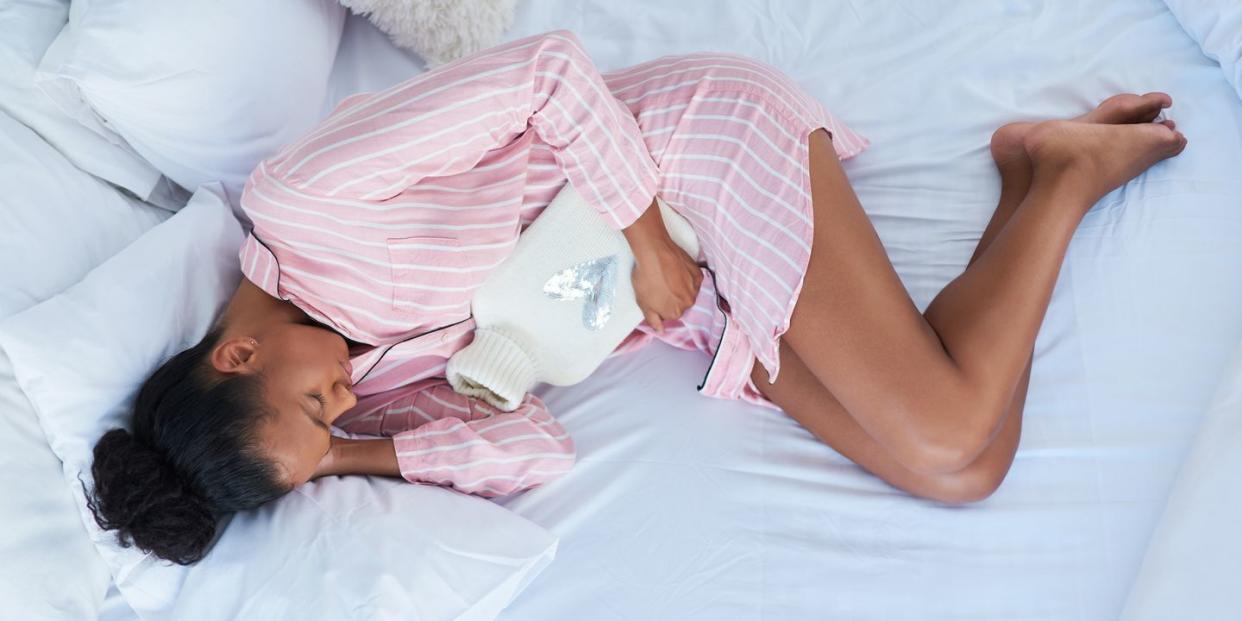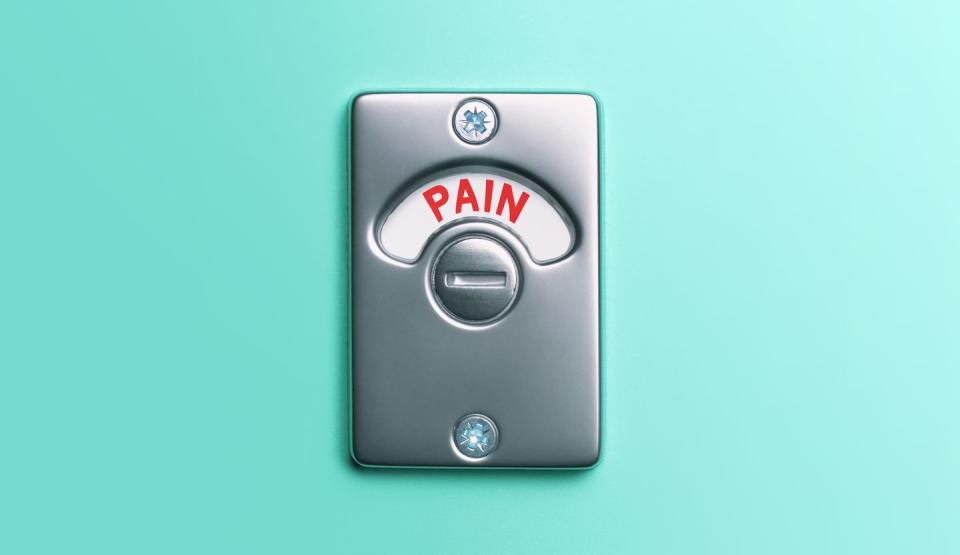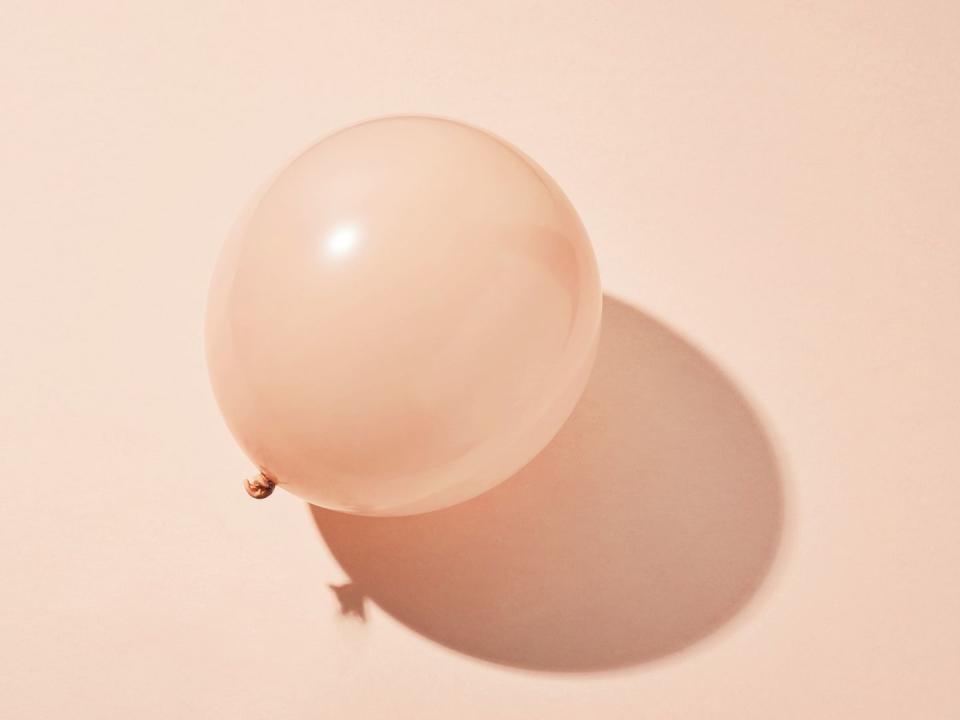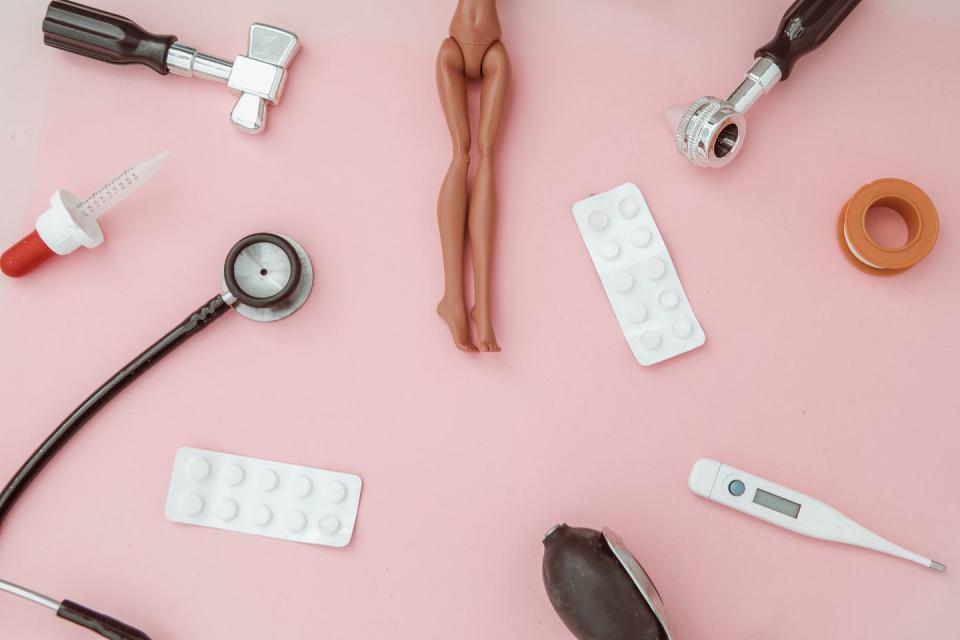The PMS symptoms you might even realise you have

We all basically know what PMS is - chances are, you’ve experienced symptoms ranging from mild to more extreme at some point in your lifetime. According to the Office of Women’s Health, over 90% of people who have periods say they get some premenstrual symptoms, such as bloating, headaches, and moodiness - but how and why does it affect us all so differently, exactly?
Turns out PMS is more than just cramps and stress for some (although they can be a huge part of it), which is why it can be incredibly difficult to diagnose. From the symptoms to how to actually deal with it, here's what you need to know...
What is PMS?
PMS stands for premenstrual syndrome, and is the name given to the collection of symptoms you may experience before your menstrual cycle.
“It’s very common and affects most people who have periods, but unfortunately for some, it is more severe and can drastically affect their daily life,” explains Sarah Welsh, Gynaecology Doctor and Co-Founder of female led sexual health brand, HANX.
The Office of Women's Health says those in their 30s are most likely to suffer from PMS, but that doesn’t mean that’s always the case. It can affect anyone from teenagers to those heading into the menopause, and can be so debilitating that it affects even the smallest of tasks.

Niamh, a PR Manager from Manchester, also suffers from endometriosis, which seems to make her PMS even worse. “My nausea is strong so I won't be able to even stomach food,” she tells Cosmopolitan. “I'm bloated, and as much as I joke about it, I usually do look about five months pregnant.
“I'm also much more exhausted than usual and I can find that I will sleep from 6pm straight through to 7:30am and still be tired. I find that I have to be quite meticulous in planning out the time around my period as well as when it hits, so I can make the most of when I will have energy and when I won't.”
What are the symptoms of PMS?
Sound familiar? Some of us suffer from PMS without really knowing it. Period tracker apps can be useful for keeping an eye on when you’re feeling rough, but Sarah says common PMS symptoms to keep an eye out for include:
mood swings
tiredness and headaches
feeling upset, anxious or irritable
bloating
increased acne
a change in appetite and libido.
Who gets PMS?
Honestly, probably most people with periods you know.
“Anyone who has a menstrual cycle can get PMS: the symptoms can vary from person to person, and from month to month,” explains Sarah.
What causes PMS?
Ok, so here's where things get a little bit more complicated, since PMS symptoms vary so widely. Whether emotional or physical, symptoms can often be passed off as something else (tiredness, stress etc.) which is why it's important to keep an eye on your cycle where possible.
"The changes in your hormones during the menstrual cycle is the likely cause of many symptoms in PMS," says Sarah. "The hormone progesterone peaks at the end of your menstrual cycle, then drops when you start your period (i.e. at the start of your menstrual cycle) and this is thought to be the cause of PMS.
"Some people are more affected by fluctuations than others as their bodies are sensitive in responding to the change in hormone levels in the lead up to a period. However, as the case with many things in female health, there is a lot more research to be done and PMS is not fully understood, yet."

How is PMS diagnosed?
If you're concerned about PMS, you should book an appointment to talk with your doctor. "Your medical professional can diagnose PMS by talking to you and taking a history to ensure there is nothing else going on," explains Sarah.
There is no blood test or unique physical finding on examination, but the below three things are present in PMS:
The main presenting complaint is an emotional symptom associated with PMS such as moodswings, feeling upset anxious or irritable.
Symptoms coincide in the premenstrual phase and reduce or disappear just before or when menstruation happens.
The symptoms interfere with the person’s day to day life.
What happens when PMS gets extreme?
A small number of women (5-8%) may experience more severe symptoms of PMS known as premenstrual dysphoric disorder (PMDD).
Kim, a journalist from London, is one of those people. She told Cosmopolitan: "I’ve suffered from PMDD ever since I was around 15. It has had a serious debilitating effect on my life, and has seen me jeopardise my mental wellbeing, my close relationships and even my career.
"PMDD is like PMS on steroids, but I wasn’t even aware it existed until I was 24. I had always struggled for a fortnight before my period, but I didn’t have the tired and tearful symptoms – I had days where my brain felt thick with fog, clouding my vision and leaving me unable to string a sentence together. Then a few days later, I’d see the streak of blood in the loo, and a wave of relief would wash over me.
"I hadn’t even initially made the link that it was my periods fuelling my behaviour until after a long chat with a psychiatrist following a hospital visit in 2018, after I walked out of a job I had fought so hard to get. I thought I had been bipolar or depressive.
"Now I highlight the two weeks running up to that date on my calendar, and I aim to be slightly kinder to myself."
While it's a smaller percentage of people that suffer, Sarah says the effects can be extreme: "PMDD causes severe irritability, depression, or anxiety in the lead up to menstruation. This can be debilitating and it’s important to get specialist help and support to manage PMDD."
How does PMS affect other health issues?
Unfortunately, PMS can make other health issues even worse. "Understandably, it’s more tricky to manage and cope with other health issues while feeling tired, low, or moody," says Sarah. "Experiencing PMS symptoms may also trigger people to make poorer health choices, such as craving and eating sugary foods and resisting exercise.
"Roughly 50 percent of people who suffer PMS also have another health issue which is exacerbated during the premenstrual period too. These tend to be things that are similar to PMS symptoms, including depression and anxiety disorders, ME/chronic fatigue syndrome, and irritable bowel syndrome amongst others."

What medicines can treat PMS?
Diagnosing PMS is difficult, which means getting the right treatment can be a struggle.
Sarah explains: "To manage the symptoms triggered by PMS, it’s important to ensure you’re generally healthy. The usual things apply - eat well, get regular exercise, ensure you get enough sleep, maintain a healthy weight, and managing stress.
"Anti-depressants are sometimes used to manage the symptoms for people with severe PMS.
"Hormonal contraceptives are also a recommended treatment for PMS and PMDD – Some people take the pill continuously (not having any hormone-free days) which may be a particularly good for people with PMDD to avoid fluctuations in hormones.
"There are some alternative therapies for PMS including evening primrose oil, vitamin B6 and chasteberry, amongst others. Studies for these treatments have shown mixed results, but they do help for some people."
There are also brands such as Ohne or Daye, who create products specifically designed to treat period pains using CBD.
As always, it's important to speak with your GP before taking any new medicine - and remember to book an appointment if your PMS is affecting your normal life.
Follow Abbi on Instagram.
SUBSCRIBE HERE to have Cosmopolitan delivered to your door.
Like this article? Sign up to our newsletter to get more articles like this delivered straight to your inbox.
You Might Also Like


